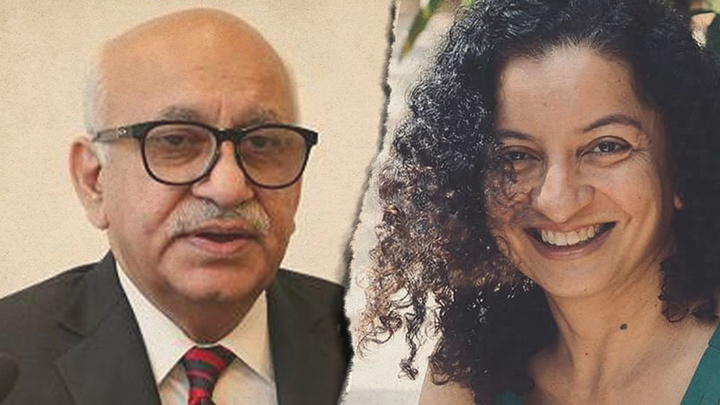Priya Ramani’s lawyer makes final arguments in MJ Akbar defamation suit
Continuing from where she had left off on Saturday, Priya Ramani’s lawyer, Rebecca John, presented her final arguments at a virtual hearing on the defamation suit brought against the journalist by Bharatiya Janata Party leader MJ Akbar.
Akbar had filed the case in October 2018, after Ramani accused him of sexual harassment.
John started by reading a 2017 Vogue article written by Ramani that included allegations of sexual harassment against a “famous editor”, whom Ramani later identified as Akbar. John reiterated Ramani’s statement that only the first four paragraphs of the article referred to Akbar and the rest was a commentary on male bosses in general.
“What stopped her from saying that other than the first four paras, the article didn’t refer to him?” John asked, rejecting the opposing lawyer’s claim that Ramani’s allegations against Akbar were “nothing but a figment of her imagination”. “What she says about the structure of the article should be taken to be the last word.”
John pointed out that Ramani wasn’t the first women to accuse Akbar of sexual harassment. Gazala Wahab, Saba Naqvi, Sutapa Paul, and Suparna Sharma had done so as well.
“Did all of them lose their minds while tweeting?” she asked. “These are women in responsible positions tweeting responsibly.”
Ramani identified Akbar as the editor who had allegedly harassed her in a series of Tweets in October 2018.
John also referred to a Firstpost article mentioning the 18 women who had made allegations of harassment against Akbar then. She noted that Akbar had admitted to reading the piece.
“There’s a tacit admission that this article carried painful disclosures of multiple women. Not really evidence of stellar reputation.”
Akbar had complained that he had established a stellar reputation in South Asia by publishing a number of books which Ramani damaged by accusing him of harassment. “Ramani’s allegations damaged my reputation in the eyes of my family, friends and public,” he had said.
In her concluding arguments, Akbar’s lawyer Geeta Luthra had said that when it was falsely reported that Akbar had resigned as a central minister following the harassment allegations, Ramani tweeted that it was a “big victory”. It showed that she was an unethical journalist, Luthra had suggested.
John responded by reading from Ramani’s cross-examination: “My tweet was an honest mistake.”
The lawyer then pointed out that Akbar had resigned three days later.
Asked by Luthra whether she had issued a corrigendum after realising that the news of Akbar’s resignation was false, John retorted that she didn’t know if anybody could issue a corrigendum on Twitter.
“It’s being suggested that Priya Ramani is an unethical journalist,” she continued. “You become an unethical journalist when you defy Press Council and workplace ethics by sexually harassing women, not by tweeting a wrong piece of news.”
She claimed that Akbar’s carousel had spoken at length about Ramani’s tweets but not the incident of harassment, which is reported to have taken place in a Mumbai hotel in 1993.
“Why?” John asked, rhetorically. “Because they know she is telling the truth.”
Responding to the opposing counsel’s claim that Ramani had tried to damage Akbar’s political career, John read from the journalist’s statement, “I didn’t do it for political reasons. But even if I take the allegation at the highest, as per them I waited two years after he joined the party to make the allegation. My accusations have no connection with his political journey.”
(The case will now be heard on September 14)
www.newslaundry.com





